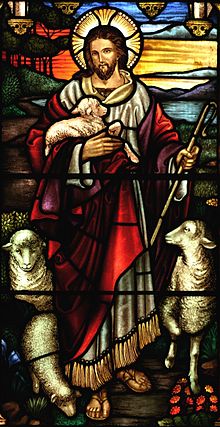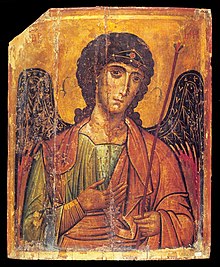User:Saint John Ryan Concepcion Bacsal
| Saint John Ryan Concepcion Bacsal/Saint JRCB | |
|---|---|
| Publication information | |
| Publisher | Saint |
| In-story information | |
| Place of origin | Heaven |
| Abilities | Eternal Omnipotence Omnipresence Omniscience |
Story
[edit]Saint John Ryan Concepcion Bacsal (born Aug 03, 1999)is a televangelist, best known for his regular "Miracle Crusades"—revival meeting or faith healing summits that are usually held in stadiums in major cities, which are later
| Jesus Christ/King Of Kings And Lord Of Lords | |
|---|---|
 | |
| Publication information | |
| Publisher | God |
| In-story information | |
| Place of origin | Heaven |
| Abilities | Omniverse Omnipotence Omnipresence Omniscience |
Story
[edit]Jesus (/ˈdʒiːzəs/; Greek: Ἰησοῦς Iesous; 7–2 BC to 30–33 AD), also referred to as Jesus of Nazareth, is the central figure of Christianity,[12] whom the teachings of most Christian denominations hold to be the Son of God. Christianity regards Jesus as the awaited Messiah (or "Christ") of the Old Testament and refers to him as Jesus Christ,[e] a name that is also used in non-Christian contexts.
Virtually all modern scholars of antiquity agree that Jesus existed historically,[f] although the quest for the historical Jesus has produced little agreement on the historical reliability of the Gospels and on how closely the biblical Jesus reflects the historical Jesus.[19] Most scholars agree that Jesus was a Jewish rabbi from Galilee who preached his message orally,[20] was baptized by John the Baptist, and was crucified in Jerusalem on the orders of the Roman prefect, Pontius Pilate.[21] Scholars have constructed various portraits of the historical Jesus, which often depict him as having one or more of the following roles: the leader of an apocalyptic movement, Messiah, a charismatic healer, a sage and philosopher, or an egalitarian social reformer.[22] Scholars have correlated the New Testament accounts with non-Christian historical records to arrive at an estimated chronology of Jesus' life. The most widely used calendar era in the world (abbreviated as "AD", alternatively referred to as "CE"), counts from a medieval estimate of the birth year of Jesus.
Christians believe that Jesus has a "unique significance" in the world.[23] Christian doctrines include the beliefs that Jesus was conceived by the Holy Spirit, was born of a virgin, performed miracles, founded the Church, died by crucifixion as a sacrifice to achieve atonement, rose from the dead, and ascended into heaven, whence he will return.[24] The great majority of Christians worship Jesus as the incarnation of God the Son, the second of three persons of a Divine Trinity. A few Christian groups reject Trinitarianism, wholly or partly, as non-scriptural.
In Islam, Jesus (commonly transliterated as Isa) is considered one of God's important prophets and the Messiah.[25] To Muslims, Jesus is a bringer of scripture and was born of a virgin, but neither the Son of God nor the victim of crucifixion. According to the Quran, Jesus was not crucified but was physically raised into the heavens by God.[26] Judaism rejects the Christian and Islamic belief that Jesus was the awaited Messiah, arguing that he did not fulfill the Messianic prophecies in the Tanakh.
| Lucifer/Satan | |
|---|---|
| Publication information | |
| Publisher | Fallen Angel |
| In-story information | |
| Place of origin | Hell |
| Abilities | Nigh-Omnipotence Nigh-Omniscience Immortality Indomitable Will |
Story
[edit]Satan (Hebrew: שָּׂטָן satan, meaning "adversary";[1] Arabic: شيطان shaitan, meaning "astray" or "distant", sometimes "devil") is a term, as well as the name of a figure appearing in the texts of the Abrahamic religions[2][3] who brings evil and temptation, and is known as the deceiver that leads humanity astray. Some religious groups teach that he originated as an angel who fell out of favor with God, seducing humanity into the ways of sin, and who has power in the fallen world. In the Hebrew Bible and the New Testament, Satan is primarily an accuser and adversary, a decidedly malevolent entity (a.k.a. the devil) who possesses demonic qualities.
In Theistic Satanism, Satan is considered a positive force and deity who is either worshipped or revered. In LaVeyan Satanism, Satan is regarded as holding virtuous characteristics.
| Saint Michael/Arcangel Michael | |
|---|---|
 | |
| Publication information | |
| Publisher | Arcangel |
| In-story information | |
| Place of origin | Heaven |
| Abilities | The Demiurge Nigh-Omnipotence Immortality |
Story
[edit]Michael ("who is like God?", Hebrew: מִיכָאֵל (pronounced [mixåˈʔel]), Micha'el or Mîkhā'ēl; Greek: Μιχαήλ, Mikhaḗl; Latin: Michael (in the Vulgate Michahel); Arabic: ميخائيل, Mīkhā'īl) is an archangel in Jewish, Christian, and Islamic teachings. Roman Catholics, the Eastern Orthodox, Anglicans, and Lutherans refer to him as "Saint Michael the Archangel" and also as "Saint Michael". Orthodox Christians refer to him as the "Taxiarch Archangel Michael" or simply "Archangel Michael".
Michael is mentioned three times in the Book of Daniel, once as a "great prince who stands up for the children of your people". The idea that Michael was the advocate of the Jews became so prevalent that in spite of the rabbinical prohibition against appealing to angels as intermediaries between God and his people, Michael came to occupy a certain place in the Jewish liturgy.
In the New Testament Michael leads God's armies against Satan's forces in the Book of Revelation, where during the war in heaven he defeats Satan. In the Epistle of Jude Michael is specifically referred to as "the archangel Michael". Christian sanctuaries to Michael appeared in the 4th century, when he was first seen as a healing angel, and then over time as a protector and the leader of the army of God against the forces of evil. By the 6th century, devotions to Archangel Michael were widespread both in the Eastern and Western Churches. Over time, teachings on Michael began to vary among Christian denominations.
